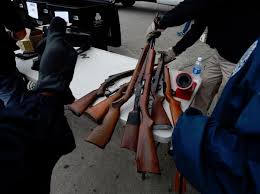A Chinese citizen residing unlawfully in California has confessed to orchestrating an illegal weapons pipeline to North Korea while operating as an undeclared agent for Pyongyang, according to federal prosecutors. The U.S. Department of Justice revealed that Shenghua Wen entered guilty pleas for two criminal counts: conspiracy to breach the International Emergency Economic Powers Act (IEEPA) and functioning as an unregistered foreign government representative.
Court documents indicate the 42-year-old Ontario resident shipped multiple containers containing military-grade equipment toward North Korea during 2023. Prosecutors confirmed at least one shipment successfully reached Nampo, North Korea after transiting through Hong Kong. The illicit operation saw Wen purchase a Houston-based firearms business to camouflage his activities, utilizing fraudulent documentation to conceal container contents from customs inspections.
Investigators determined that Wen acquired approximately 60,000 rounds of 9mm ammunition alongside sensitive defense technology—including chemical threat detection devices—for transfer to the sanctioned nation. During FBI interrogations, Wen disclosed his belief that Pyongyang intended these resources for potential aggression against South Korea.
The intricate smuggling operation originated years earlier when North Korean officials recruited Wen during meetings at their Chinese embassy. After entering the United States on a student visa in 2012, Wen received nearly $2 million in funding from Pyongyang to execute the scheme. In his plea agreement, Wen acknowledged full awareness of the legal prohibitions against exporting such materials to North Korea without required licenses.
"The defendant admitted to systematically violating U.S. export controls while deliberately failing to disclose his status as an agent operating under North Korean direction," stated the U.S. Attorney's Office for the Central District of California. This admission satisfies both charges: acting without notifying the Attorney General about foreign representation and intentionally bypassing IEEPA restrictions designed to protect national security interests.
The IEEPA empowers presidential intervention in economic transactions with nations deemed security threats. North Korea remains subject to comprehensive U.S. sanctions due to its nuclear proliferation activities and human rights violations. This prosecution highlights ongoing concerns about illicit procurement networks employed by sanctioned states to circumvent international arms embargoes.
Wen, apprehended last December following a multi-agency investigation, now awaits sentencing scheduled for August. Legal statutes mandate severe penalties: a maximum 20-year incarceration for IEEPA violations plus an additional decade for unlawful foreign representation. The case underscores heightened vigilance by U.S. authorities regarding transnational weapons trafficking operations benefiting adversarial regimes.








Comments (0)
Leave a Comment
Be the first to comment on this article!